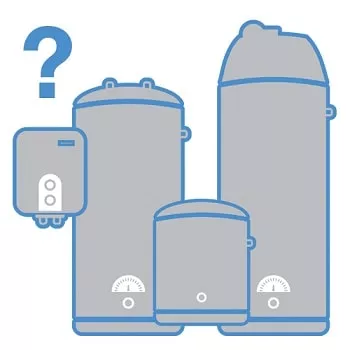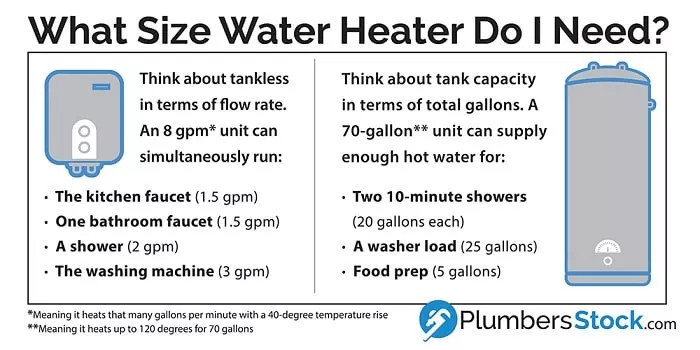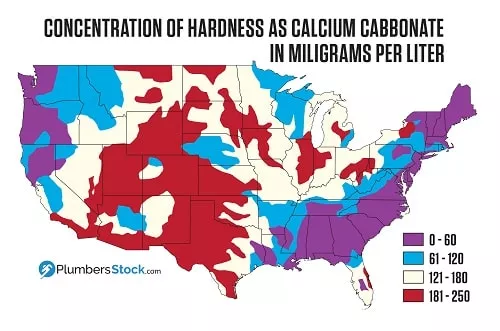When you're in the market for a new water heater, you're going to have to make a lot of decisions. This water heater buyer's guide is intended to ease the burden of that decision by helping you to organize all the important information and processing it. Let's start with the most important choice.
Water Heater Fuel Types

There are several different types of fuel for hot water heaters. The three most common are electricity, natural gas, and liquid propane. Most people choose the fuel type compatible with their home's existing infrastructure. If you don't have natural gas running to your home, you probably need to settle for electric. Natural gas seems to be the ideal fuel for convenience, efficiency, and cost.
Storage Tank Water Heater or Tankless?
If you are going electric, then this is sort of a toss-up decision. Electric isn't the most efficient way to fuel tankless water heaters. You may want to stick to a traditional tank water heater.
However, with natural gas installations, the technology is now where tankless is viewed as superior to tank, almost unanimously. You only heat the water you use, and tho a more expensive purchase, tankless installations last quite a bit longer. You save in the long run and conserve energy. If you don't think you will live in your home long, it may not be worth the initial investment (although you can use the on-demand unit as a selling point).
What's the Difference?
Storage water heaters have a reservoir of hot water readily available. When you turn the tap to hot, it takes that hot water directly out of the top of the tank. When water is taken out of the tank, it is simultaneously replacing it at the bottom of the tank with cold water, ensuring that it is always full. That cold water is then heated.
With an instant hot water heater, the water passes through the unit where a heat exchanger does the work. This provides hot water instantaneously and constantly for as long as needed. This eliminates the need to store hot water in a tank to be reheated and also eliminates the standby heat loss that occurs when the heater is not being used.
Read more about Tank vs. Tankless Water Heaters.
What Size Water Heater Do I Need?
For tankless, what you need to know is that the flow rates of your faucets and appliances are an important factor. You just need to be able to do a little math. You'll see BTU outputs listed pretty prominently on new water heaters, but what you really need to know is how many gallons per minute it can heat? If the unit can heat 8 gallons per minute, that means you can run hot water to at least five faucets that operate at 1.5 GPM. Tubs and showers operate at about 2 gallons per minute. If you have a large home, consider that it might be a good idea to get two smaller output tankless units, as opposed to one large one.

For storage installations, you need to make a calculation based on the capacity of the tank. A 10-minute shower uses up about 20 gallons of water. That means that a 55-gallon water heater tank will deliver hot water for up to three simultaneous showers. Factor in that you might be doing food prep and other chores, and it's easy to see why big families choose 100-gallon tanks or opt to go with on-demand solutions. For crying out loud, you need 15-30 gallons just to wash a load of laundry (and that's with newer, efficient washers). Another thing you need to consider is the first-hour rating, which indicates how much hot water you can produce in the first hour after usage.
How Long Do Water Heaters Last?
Well, that really depends on the type and also what kind of stress you put on it.
- Tank water heaters typically last 8-12 years. It's not all that uncommon to make them last as many as 15 years, though.
- If you have a tankless water heater, you should expect it to last about two decades, mainly if you go with a series built to last, like the Takagi X3 series.

Other Features & Considerations
- If you live in an area with hard water issues, you may want to look for water heaters with anti-scale technology.
- Think about where the T&P valve is located (top or side mount) and if that matters to your installation.
- What's the warranty?
- Are the drain valves made of brass or cheap plastic?
- Does the water heater have a digital display?
- Would a recirculation pump produce savings for you?
Related resources:
Tankless vs. Tank Water HeaterAre Tankless Water Heaters Worth It?
How Do Tankless Water Heaters Work?
How Long Do Tankless Water Heaters Last?



